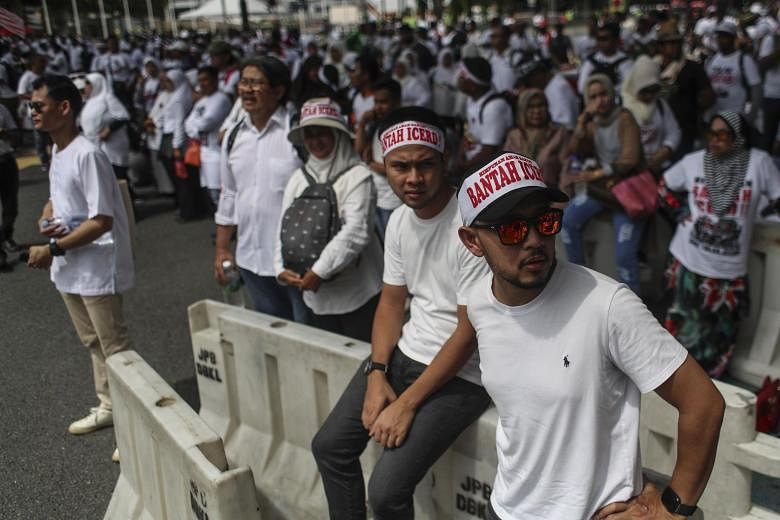PETALING JAYA (THE STAR/ASIA NEWS NETWORK) - Human rights allow for and encourage collective success, says the head of the Human Rights Commission of Malaysia (Suhakam) a day after tens of thousands of Malay Muslims rallied to celebrate the government's decision to not ratify a United Nations convention against racial discrimination.
"Human rights empower us to enjoy collective success," said Tan Sri Razali Ismail at Suhakam's Human Rights Day gathering at Padang Timur on Sunday (Dec 9).
"Many governments have been able to achieve economic success because of their respect for human rights.
"People crave liberation from poverty, and citizens in nations that are built on greater economic freedom enjoy greater access to ideas and resources to participate fully in an increasingly interconnected and competitive world, leaving no one behind."
After weeks of pressure by pro-Malay groups, Prime Minister Mahathir Mohamad's multi-ethnic government decided last month that it would not ratify the International Convention on the Elimination of All Forms of Racial Discrimination (ICERD).
Tens of thousands of Malay Muslims mobilised by opposition parties rallied in Kuala Lumpur on Saturday (Dec 8) to celebrate the government's U-turn.
Suhakam's gathering on human rights that was scheduled to take place on Saturday was postponed until Sunday over security concerns. Tun Mahathir, who had been due to attend the Suhakam gathering, did not show up on Sunday.
At an education event on Saturday, Dr Mahathir said his government refused to ratify ICERD because Malays need more opportunities to not be left behind.
But Mr Razali said on Sunday that the historic change of government after the May 9 election, which saw Dr Mahathir's coalition wrest power from long-time ruling alliance United Malays National Organisation or Umno, was an example of Malaysians standing up for human rights.
"When Malaysians bring about change in Malaysia by voting against bad governance, we made the decision to reject corruption, to reject bad governance.
"These (corruption and bad governance) were violations against human rights.
"So, what we did on that historic day together as Malaysians, whether we realise it or not, was to stand up for human rights," he said.
He added that the principles of human rights were in line with all religions in the world, including Islam.
"Human rights has sometimes been misunderstood, seen as a threat to religion.
"To me, this view needs to be corrected, as Islam is a religion that places importance on human dignity and that is what is being championed in (the fight for) human rights," he said.
Batu Kawan MP Kasthuri Patto said in her speech that the government is committed to ensure that human rights is upheld in the country.
"Human rights will be a national agenda," said Ms Kasthuri, adding that one of the examples of the government's commitment to human rights was the abolition of the National Civics Bureau (Biro Tatanegara), which she said espoused racism.
Selayang MP William Leong said that the people should help all those in need if we truly believe in human dignity.
He also said that there is a need to cultivate a new national ethos where all races, cultures and religions believe in the inherent dignity of man.
The gathering was organised in conjunction with the World Human Rights Day 2018 which falls on Dec 10.

